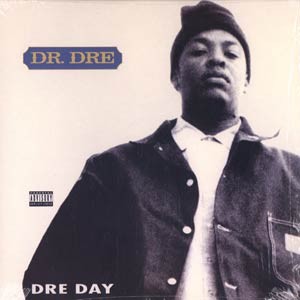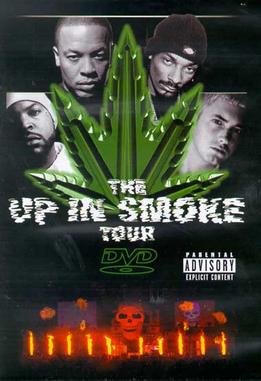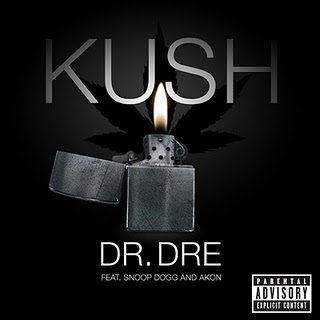
Andre Romell Young, known professionally as Dr. Dre, is an American rapper, record producer, record executive, and actor. He is the founder and CEO of Aftermath Entertainment and Beats Electronics, and co-founder of Death Row Records. Dre began his career as a member of the World Class Wreckin' Cru in 1984, and later found fame with the gangsta rap group N.W.A. The group popularized explicit lyrics in hip hop to detail the violence of street life. During the early 1990s, Dre was credited as a key figure in the crafting and popularization of West Coast G-funk, a subgenre of hip hop characterized by a synthesizer foundation and slow, heavy production.

Warren Griffin III is an American rapper, record producer, and DJ who helped popularize West Coast hip hop during the 1990s. A pioneer of G-funk, he attained mainstream success with his 1994 single "Regulate". He is credited with discovering Snoop Dogg, having introduced the then-unknown rapper to record producer Dr. Dre.

The Chronic is the debut studio album by American record producer and rapper Dr. Dre. It was released on December 15, 1992, by his record label Death Row Records along with Interscope Records and distributed by Priority Records. The recording sessions took place at Death Row Studios in Los Angeles and at Bernie Grundman Mastering in Hollywood.

Doggystyle is the debut studio album by American rapper Snoop Doggy Dogg. It was released on November 23, 1993, by Death Row and Interscope Records. The album was recorded and produced following Snoop Doggy Dogg's appearances on Dr. Dre's debut solo album The Chronic (1992), to which Snoop contributed significantly. The West Coast style in hip-hop that he developed from Dre's first album continued on Doggystyle. Critics have praised Snoop Dogg for the lyrical "realism" that he delivers on the album and for his distinctive vocal flow.

Aftermath Entertainment is an American record label founded by hip hop producer and rapper Dr. Dre in 1996. It operates as a subsidiary of Universal Music Group, and is distributed through Interscope Records.

"Gin and Juice" is a song by American rapper Snoop Dogg. It was released on January 18, 1994, as the second single from his debut album, Doggystyle (1993). The song was produced by Dr. Dre and contains an interpolation from Slave's "Watching You" in its chorus and a sample from "I Get Lifted" by George McCrae. Tony Green created its bassline; additional vocalists on the song include Dat Nigga Daz, Jewell, Heney Loc, and Sean "Barney" Thomas. "Gin and Juice" peaked at number eight on the Billboard Hot 100 in the United States. It earned a gold certification from the RIAA and sold 700,000 copies.

No Limit Top Dogg is the fourth studio album by American rapper Snoop Dogg. It was released May 11, 1999, by No Limit and Priority Records. Following the mixed reception of his previous album, Snoop began to work again with Dr. Dre and returned to the west coast sound of his earlier career while on Death Row Records. The album was generally met with positive reception with many critics citing it as a return to form and his best album since Doggystyle (1993). Many praised the production work for the album with the tracks made by Dr. Dre being highlighted as well as Snoop's delivery while criticism was mainly aimed at the length of the album, the No Limit features, and the lack of new lyrical content. The Source placed the album on their list of the "Top 10 Best Albums of the Year" for 1999.

"Nuthin' but a 'G' Thang" is a song by American rapper Dr. Dre, featuring fellow American rapper Snoop Dogg, on Dre's debut solo album, The Chronic (1992). As the album's first single it reached number 2 on the Billboard Hot 100 on March 20, 1993, behind "Informer" by Snow, outperforming The Chronic's other singles, "Fuck wit Dre Day ", which peaked at number 8, and "Let Me Ride", which peaked at number 34. The single also reached number 1 on Billboard's Hot R&B/Hip-Hop Singles & Tracks chart, and was a number 31 hit in the UK. Its music video was directed by Dr. Dre himself.

"Deep Cover", also known as "187", is the debut solo single by American rapper Dr. Dre and his first track released after the breakup of N.W.A. The track was recorded for the soundtrack of the film Deep Cover for Dick Griffey's Solar Records and distributed by Sony Epic. The song features fellow American rapper Snoop Doggy Dogg in his first appearance on a record release. The master recording rights are owned today by Dick Griffey's family company Solar Legacy Entertainment Ltd.

"Fuck wit Dre Day (And Everybody's Celebratin')", or censored as a single titled "Dre Day", is a song by American rapper and record producer Dr. Dre featuring fellow American rapper Snoop Doggy Dogg and uncredited vocals from Jewell released in May 1993 as the second single from Dre's debut solo album, The Chronic (1992). "Dre Day" was a diss track targeting mainly Dre's former groupmate Eazy-E, who led their onetime rap group N.W.A and who, along with N.W.A's manager Jerry Heller, owned N.W.A's record label, Ruthless Records. In "Dre Day" and in its music video, which accuse Eazy of cheating N.W.A's artists, Dre and Snoop degrade and menace him. Also included are disses retorting earlier disses on songs by Miami rapper Luke Campbell, by New York rapper Tim Dog, and by onetime N.W.A. member Ice Cube, although Dre, while still an N.W.A member, had helped diss Cube first. After "Dre Day," a number of further diss records were exchanged.

"Let Me Ride" is a song by American rapper and producer Dr. Dre, released in September 1993 by Death Row, Interscope and Priority as the third and final single from his debut studio album, The Chronic (1992). It experienced moderate success on the charts, until it became a massive hit when Dre won Best Rap Solo Performance for at the 36th Annual Grammy Awards. The song features singers Ruben and Jewell, as well as uncredited vocals by fellow rapper Snoop Dogg, who wrote the song.

"That's That" is the second single by Snoop Dogg from the album Tha Blue Carpet Treatment. The song was the first single taken from the album in the UK; however the single only achieved notable success in the U.S., where it reached #20 on the Billboard Hot 100 chart. The song samples the melody played in the 1988 film Coming to America during the bathroom scene in which Eddie Murphy gets washed by female servants.

The Up in Smoke Tour was a West Coast hip hop tour in 2000 which was headlined by Dr. Dre and Snoop Dogg, also featuring artists and disc jockeys Ice Cube, Eminem, Proof, Nate Dogg, Kurupt, D12, MC Ren, Westside Connection, Chilldrin of da Ghetto, Mel-Man, Tha Eastsidaz, Doggy's Angels, Devin The Dude, Warren G, Crucial Conflict, TQ, Truth Hurts, Xzibit, The D.O.C., Hittman, DJ Crazy Toones, Six-Two, Ms. Toi, & DJ Jam.

"Zoom" is a single by American rappers Dr. Dre and LL Cool J, recorded for and taken from the soundtrack to the film Bulworth.

Death Row: The Singles Collection is a compilation album released in 2007 by CEO of Death Row Recordings, Suge Knight, it contains hard to find remixes and b sides by artists such as Snoop Dogg, Tha Dogg Pound, 2Pac, Dr. Dre plus more. This has been removed from Apple Music
David Royce Aron was an American recording engineer, live and studio mixer, record producer, and musician.

MTV Party To Go Volume 5 was the fifth album in MTV's Party To Go series. The album was certified Gold on September 20, 1994, by the RIAA.

MTV Party To Go Volume 9 was the ninth album in the MTV Party To Go series. The album was certified gold on January 16, 1997, by the RIAA.

MTV Party To Go Volume 10 was the tenth album in the MTV Party To Go series. The album was certified gold in January 1997 by the RIAA.

"Kush" is a single by American rapper Dr. Dre, featuring vocals by Snoop Dogg and Akon. It was released via digital download on November 18, 2010. The song was produced by DJ Khalil and mixed by Dr. Dre, with additional keys by Daniel "Danny Keyz" Tannenbaum. The song has additional vocals by Sly "Pyper" Jordan, Kobe Honeycutt, Blackthoven and Slim the Mobster.


















